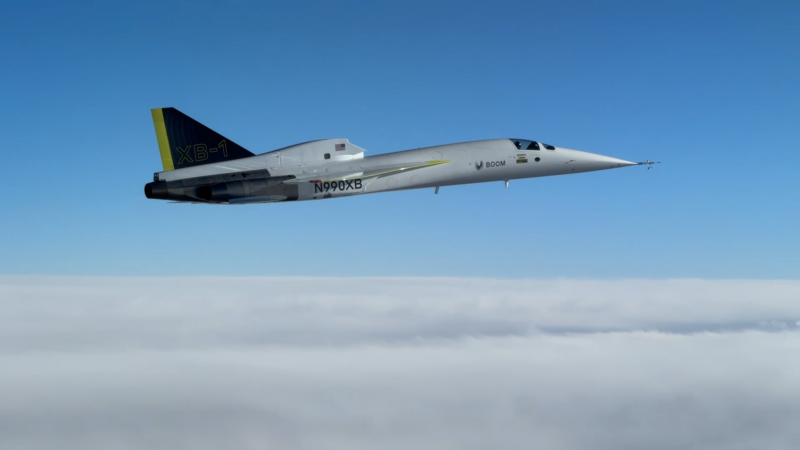The company planning a successor to Concorde makes its first supersonic test
A private company aiming to build the first supersonic airliner since the Concorde retired more than two decades ago achieved its first sound-barrier-busting flight over California’s Mojave desert on Tuesday.
Denver-based Boom Supersonic’s XB-1 demonstrator plane, with Chief Test Pilot Tristan “Geppetto” Brandenburg at the controls, hit Mach 1.122, or 750 mph, at an altitude of about 35,000 feet. Brandenburg brought the plane to a successful landing at the end of the approximately 34-minute flight.
Founder and CEO Blake Scholl described the flight as “phenomenal.”
“We’re ready to scale up. We’re ready to build the passenger supersonic jet that will pick up where Concorde left off and ultimately allow the rest of us to fly supersonic,” Scholl said.
The Mach 1 milestone was reached on the 12th test flight of the XB-1. The company says it plans to incorporate what it learns from the XB-1 into a supersonic passenger jet known as Overture that can carry up to 80 passengers. The new passenger plane is designed to maintain a cruising speed of Mach 1.7, or roughly twice as fast as current commercial jet airliners.
According to Boom, United, American and Japan Airlines have all expressed interest in purchasing the Overture. In a statement emailed to NPR, United Airlines said that in 2021, it “reached a conditional, non-binding purchase agreement” with the company to buy 15 of the airliners, with “options for up to an additional 35 aircraft.”
Boom says it expects Overture to be ready for commercial flights by 2030. The plane is expected to be capable of transoceanic flights at altitudes up to 60,000 feet — much higher than conventional jet airlines, “high enough to see the curvature of the earth below,” according to the company. “Flying at supersonic speeds tends to be smoother than subsonic flight because at 60,000 feet, you’re flying above most turbulence,” it says.
Unlike Concorde, which proved uneconomical to operate, Boom says airlines should be able to make a profit selling seats on Overture at fares similar to those for first and business class seats on current commercial airliners.
“The biggest problem with Concorde was it was just simply too expensive to operate,” Scholl said. “So the single most important problem to solve is not to break the sound barrier, but to break the economic barrier.”
Concorde made its first operational flight from London to Washington, D.C., in 1976. Developed jointly by Britain and France, Concorde was operated for nearly three decades by Air France and British Airways.
However, the jet was criticized for its inefficiency. Compared to a Boeing 747, the delta-wing Concorde guzzled four times as much fuel and carried only one-fifth as many passengers — around 100. The plane was also the subject of complaints about noise from its loud turbojet engines and its sonic booms.
Scholl says Concorde had very loud, converted military engines, but Overture will be “dramatically quieter, and that means around an airport, Overture will be no louder than the subsonic airplanes that are flying today.”
In 1996, Concorde set a speed record of just 2 hours, 52 minutes, and 59 seconds between New York and London. In 2000, a Concorde was involved in a fiery crash shortly after takeoff from Paris Charles de Gaulle Airport that killed all 100 passengers and nine crew aboard France Air Flight 4590. The supersonic planes were grounded but eventually returned to service. Always a money-loser, the Concorde was eventually retired in 2003.
Trump says he’s ending Secret Service protection for Biden’s adult children
President Trump said he was ending "immediately" the Secret Service protection details assigned to Democrat Joe Biden's adult children.
Israel launches deadly series of attacks on Gaza
Israel said the early Tuesday attacks were launched after Hamas refused to release more hostages held in Gaza. The strikes appeared to end the current ceasefire that took began in mid-January.
He lost his first LA Marathon medal in the fires — this weekend he got his second
15-year-old fire survivor Abel Rivera's home in Altadena burned down in January, and he lost everything — including his medal for finishing the 2024 LA Marathon.
A U.S. airman is charged in death of a South Dakota woman who had vanished in August
Quinterius Chappelle was arrested on a federal charge of second-degree murder in the death of Sahela Sangrait, according to the Pennington County Sheriff's Office.
Harvard will be free for students whose families make $100,000 or less
The expanded financial aid plan will also offer free tuition to families that make $200,000 or less. The move comes after affirmative action was barred from the admissions process.
Judge seeks sworn declaration from Justice Department in deportation case
At issue was whether plane-loads of alleged members of the Tren de Aragua gang were deported despite the judge's order to turn the planes around.








